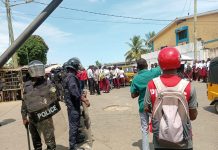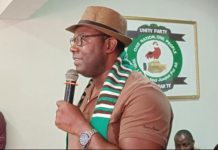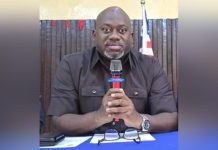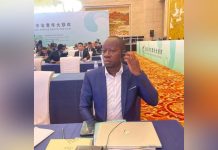Africa-Press – Liberia. In February 2019, four opposition political parties – the former ruling Unity Party (UP), the All Liberian Party (ALP), the Liberty Party (LP) and the Alternative National Congress (ANC) decided to bond in hopes of forming a formidable force to unseat the incumbent President George Manneh Weah in the 2023 Presidential Elections. In the days after the announcement of the alliance, skeptics and critics alike were quick to adopt a cautious stance – and for obvious reasons. In recent political history, Liberia has had several variations of collaborating forces, aiming to unseat a sitting president.
Historical Lessons
In the October 1985 elections, President Samuel Kanyon Doe, was proclaimed the winner in an election he is widely believed to have lost to Jackson F. Doe of the Liberia Action Party.
In that election, Jackson Doe secured 137,270 votes for 26.45 percent, Gabriel Kpolleh, a schoolteacher, secured 59.965 votes for 11.55 percent while Edward Kesselly of the Unity Party secured 57,443 votes for 11.07 percent. The Liberian Constitution requires an absolute majority or 50% plus one (1) to avoid a run-off but many political observers at the time believed that a united front against Doe may have made it tougher for the incumbent to steal the votes.
At the time, many political observers were of the view that if the four political parties had put their forces together, it may have curbed Samuel Doe’s margin of victory or left very little room for irregularities.
Similarly, during the reign of President Charles Taylor, a similar scenario played out that saw Taylor win the presidency by a landslide, with 75.3% of the vote, despite campaigning on the slogan: “He killed my ma, he killed my pa, but I will vote for him.” His closest competitor, Ellen Johnson-Sirleaf, collected only 10 percent of the vote. Eleven other candidates failed to crack more than five percent. Lost in the aura of Mr. Taylor’s victory was the fact that the opposition took the power of the incumbent for granted.
At least thirteen political parties challenged Taylor in the ’97 elections, prompting Sirleaf to stress years later in an interview with FrontPageAfrica, the importance of opposition collaboration. “No political party as I see it, based on my political experience will win this election without a coalition. I don’t think any political party can win on its own, given the number of parties. So, if you see people negotiating, dialoguing and all, it’s because they all realize that some coalition has to be made for a particular party or parties to be competitive.”
Fast-forward to the 2011 Presidential elections, the incumbent Ellen Johnson-Sirleaf highlighted the progress made in several areas during her first term while emphasizing her expertise in nation building and her administration’s work in relieving the country’s debt, paying civil servants on time, rebuilding the Armed Forces of Liberia, improving basic services and infrastructure, and restoring Liberia’s international standing.
Those achievements, coupled with the fact that sixteen other political parties chose to challenge Sirleaf’s second quest made it an easy ride for Sirleaf who trounced her opponents in the first round of the presidential election, with 43.9% of the vote, followed by Ambassador Winston Tubman of the Congress for Democratic Change(CDC) with 32.7%. As no candidate received an absolute majority, Sirleaf and Tubman stood in a run-off election held on 8th November 2011. Tubman alleged that the first round had been rigged in Sirleaf’s favor and called on his supporters to boycott the run-off. On November 15, 2011, the National Elections Commission declared Sirleaf the winner of the run-off on 15 November 2011 with 90.7% of the vote.
Sirleaf rode to her second term victory despite enduring a rugged first term marred by allegations of corruption and claims of nepotism that she simply had too many family members in her government.
On the eve of the 2011 elections, the opposition appeared to be confident that victory was certain and that Sirleaf was on the ropes. But the political genius of Sirleaf was once again on display.
Using the power of her incumbency, Sirleaf and her team did everything to kill off the only visible threat standing in her way: A dream ticket which was supposed to see the late Charles Walker Brumskine teaming up with the football legend George Weah never saw the light as both men went their separate ways, Brumskine, running on his Liberty Party ticket while Weah ended up teaming up with Ambassador Winston Tubman as a Vice Presidential candidate. Ten years later, it appears that a similar refrain is already playing out.
Framework Wahala
Since the December 2020 Midterm Senatorial Results which which favored the opposition CPP, in the months following, relationship amongst the four leaders – former Vice President Joseph Boakai(UP), Benoni Urey(ALP), Senator Nyonblee Karnga-Lawrence(LP) and Alexander Cummings(ANC), has been anything but cordial.
In fact, over the past few weeks, the fight has intensified over allegations of tampering with the Collaborative Framework Document of the four political parties.
The allegations first surfaced in August when Mr. Benoni Urey, the political leader of the All-Liberian Party (ALP) who has publicly pledged his support for the 77-year old former Vice President of the Unity Party, alleged that high-ranking members of the CPP altered the Framework Agreement of the political body, despite it being in existence for over a year, and formed the basis for the CPP’s participation in at least two elections.
Mr. Urey, only citing unimpeachable sources, failed to mention the names of those he believes altered the framework, neither has he mentioned, as at this report, which provisions or articles of the framework was allegedly altered.
Ironically, on May 19, 2020, all four parties sealed their individual fates into a unified front when the four leaders, Cummings(ANC), Urey(ALP), Boakai(UP) and Senator Karnga-Lawrence(LP) affixed their signatures to the CPP Framework Document.
At the time, all parties expressed confidence in the document in hopes of seeing the alliance through to its fruition. “Today we make history. Four of the leading political parties in our country are taking a leap of faith trusting each other, counting on the best wishes of the Liberian people to stand together in gallant support and consolidation of our young democracy which is being threatened by the lack of democratic leadership currently on display in our country,” Senator Lawrence told the gathering at last May’s signing.
Expounding further, Senator Lawrence pledged the CPP membership support and trust in each other, laying aside their personal ambitions for the collective good of the country. “Especially with this administration which is violating rights and leading by exclusion and division of our people, we understand the heavy burden placed upon our heads to look beyond self, and for the people who have a right to feel abandoned and leaderless as they suffer health crisis and economic difficulties. We know we cannot fight for the people against the creeping abuses and tyranny of this administration while we fight separately and at times against each other. The wishes of the Liberian people demand that we come together. And so today, we dutifully commit to the wishes of our people,” Senator Lawrence averred.
The framework signing came in the buildup to the 2020 Special Senatorial Elections and was seen as the finalization of a document which showed immense progress toward building a strong collaboration among the four parties as all contending issues which delayed the signing of the document had been amicably resolved.
Withdrawal Clause – The Sticky Point
Despite the agreement on the framework, the recent debacle appears to be compounded by pressure from some surrogates of the former ruling Unity Party who have taken to social media in recent weeks urging a breakup of the alliance, or the removal of the ANC ostensibly for the ongoing challenge to the former ruling party and their 2017 Standard Bearer, former Vice President, Joseph N. Boakai, who they believe deserves another chance against President Weah in 2023. Cummings appears to be mounting an uncomfortable challenge with the ANC confident it can win the former VP at a CPP democratic primary.
All sides in the CPP believe the performance of the George Weah-led government is dismal which makes the first-term President vulnerable and beatable.
Despite the breakup calls, the fine print of the framework offers very little room to wiggle, or opportunities for any one party to pullout of the alliance.
Article 8, Section 2 of the Framework Agreement signed by all the parties states: “A constituent party desiring to withdraw from the CPP shall first exhaust the dispute resolution mechanism in this framework document. If the constituent party which has satisfied the dispute resolution mechanism is not satisfied with the outcome, it shall file a resolution to withdraw from the CPP signed and duly executed by two-thirds of the membership of its National Executive. Committee, it being understood, however, that a party, withdrawing from the Alliance prior to the next presidential legislative and local elections shall not feed candidates in its name.”
The disagreement over the framework coming three years after the CPP’s formation is at least for now, validating earlier fears that an opposition alliance could work in Liberia. In rare cases where it did work, distrust and disagreements soon set in.
In 2009, the incumbent Ellen Johnson-Sirleaf’s Unity Party formed an alliance with the Liberian Action Party and the Liberian Unification Party. The three-party merger signed on April 1, 2009 resurrected echoes of the founding fathers of the three parties who were at the foundation of multi-party democracy in Liberia. Dr. Edward Kessely of the Unity Party, the late Gabriel William Kpolleh of the Liberia Unification Party and the late Jackson F. Doe of the Liberia Action Party contested separately in the 1985 elections won by Master/Sergeant Samuel Doe.
Ahead of the 2017 Presidential and Legislative Elections, George Weah’s Congress for Democratic Change joined forces with the former ruling National Patriotic Party of Liberia(NPP) of President Charles Taylor and former Speaker Alex Tyler’s Liberia People’s Democratic Party(LPDP). The alliance went on to win the 2017 presidential elections which brought Weah to power. Weah and his CDC ensured anyone joining them would first pledge to support him for President and not subject the contest for Standard Bearer to any internal democratic process.
Months earlier, Senator Prince Y. Johnson tried to bring key opposition figures together in hopes of challenging the then ruling Unity Party. That meeting held in Ganta, Nimba County brought together Senator Johnson’s Movement for Democracy and Reconstruction (MDR), Liberty Party’s Cllr. Charles Walker Brumskine, Benoni Urey of the All Liberian Party (ALP), Alexander Cummings of Alternative National Congress (ANC), and George Weah’s Congress for Democratic Change (CDC).
The attempt lasted only a few hours with the rest of the parties apparently refusing to agree for Weah to head the ticket. With the ongoing deliberations and accusations hovering over the CPP, echoes of past opposition alliance’s failures is once again raising concerns.
When the four parties signed the collaboration agreement back in February 2018, it was expressed as a genuinely united effort to ensure that Mr. Weah’s CDC-led government , on account of its performance, would serve only one term. Three years later, and despite the victory awarded their efforts in the Midterm Elections, the CPP appears to be on the ropes.
The current disagreement and accusation, were they based entirely on the facts, would be easy to resolve. It should not take more than sitting down for an hour and a half to compare what was agreed to and what was filed. However, it does not appear that the accusers and their surrogates are interested in the facts as they are in the politics of a breakup, the first step of which is to shroud the CPP in a scheme of infectious distrusts, and likely irreparable damage to the CPP’s intent and brand.
Even amid the concerns, Mr. Urey, at the February 2018 signing sought to allay the fears of skeptics. “We have been craving for years. We have decided to put Liberia first and to attune our political agenda in the interest of Liberia and the Liberian people, and above our individual and partisan ambitions. We are taking the bold and concrete step which we hope will never be reversed or undone.”
Now, Mr. Urey, who has not hidden his support for former Vice President Boakai for the leadership of the CPP is now leading the charge to have the public forget his public commitment to the Liberian people.
Besides the allegations regarding the tampering of the framework document, Urey and the Unity Party have of late been trumpeting the idea of a bloc voting arrangement to select the head of the CPP to face the incumbent Weah. The UP claims its delegates would be vulnerable to being bribed by the ANC hence, despite no provision for bloc voting, are demanding that all 310 of their delegates be permitted to vote as one bloc at the CPP Primary rather than individually. The ANC and the LP have publicly opposed the bloc voting calling it undemocratic and distrusting.
Telia Urey, the daughter of Benoni Urey and an executive of the ALP has also been raising concerns and throwing about allegations of tampering with the framework document.
Tit-for-Tat Over Framework
In a leaked group chat exchange with Mr. Musa Bility, Chair of the Liberty Party, which is posted in the CPP WhatsApp Chatroom, Ms. Urey accuses the ANC of doctoring the framework document, although falling short of stating the specific alterations. Ms. Urey wrote:
“Chairman Bility called me today and we had a very frank and good conversation. I must commend him for his honesty. He admitted that the framework submitted to NEC was not approved or signed by the political parties. That ANC secretariat attached signature pages to a document that was changed by some lawyers. He also said that there will be no way to get any originals, as we are requesting.
He suggested a way forward which he said he will post in here: that is to write a letter to NEC and withdraw the FRAMEWORK they have and revert to what was approved by Parties.
I suggest that the ANC formally writes the CPP and explains what transpired and how we got to this point and take responsibility for the total breach. Maybe even take action against those that committed these fraudulent acts. Thereafter, maybe we can submit a letter to NEC and recall the framework they have. This is the sad reality.”
Mr. Bility, in response disagreed. In his response, the LP Chair wrote: “Telia, what you just put in this room is a total misinformation and only intended to further deepen the already worsening atmosphere in the CPP.
This is a misrepresentation of our conversation and a manifestation of what you guys want to achieve regarding the CPP. I told you that what was happening was not necessary and that everyone of the PLs was aware that it was only after the signing of the Framework Document that the lawyers made changes and that these changes were reviewed and approved by the parties, through their Political Leaders at the LP HQ. Your PL, Mr Urey, confirmed this in public a few days ago during a press conference held at VP Boakai’s house. It is a known fact that the CPP requested a group of reputable lawyers to review the FD after the Committee finally submitted it to all parties.
Therefore, it was known to all parties that minor changes were made to the FD, and the PLs unanimously approved these changes and signed an MoU to this effect before the CPP secretariat submitted it to the NEC. Even if the claims that this final document was not circulated to some parties are anything to go by, it was their responsibility to ensure that a copy was obtained for their records. How does this amount to all the smears campaigns around the FD with no one pointing to anything in the FD that suggests fraud or alteration?
This campaign against the ANC is naked and can only be intended to tear apart the CPP. And the deafening silence of the other PLs, who are fully aware of this fact, is simply wrong. The Chair of the CPP recently requested these lawyers to re-submit the final FD submitted by them and approved by the parties so as to ascertain whether there was any difference between the lawyers’ copy and what was introduced by the ANC to NEC. The lawyers did as requested, and it shows that there’s absolutely no change—zero difference. But I guess the aim was never to seek the truth. That Henry Costa will say that the Chair of UP took your text from this room and sent it to him is even more telling. Let me say here for the record what I told you. I said to you that If the parties believe that the approval of their PLs of the changes made by the lawyers is not enough and it needs to be approved by the National Convention of the Parties, we all should agree to withdraw the FD from NEC, do the needful, and resubmit it to NEC. Doing otherwise is simply disingenuous and intended to sow seeds of discord within the CPP. It needs to stop.”
Ms. Urey insists that her father’s ALP never signed any new framework agreement. “Please leave me out of your misinformation. The fact is that there never was a press conference at VP in the last six months. I never ever signed any new Framework document or MOU. Just stop right there as it never happened.” Mr. Bility replied:
“I meant to say a press conference was held at a local hotel. It doesn’t negate the fact that there was a press conference, and you made the statement about the lawyers. The records will come out, and the truth will be known to us all. Nothing was secretly changed in the Framework Document. We all approved the revisions made by the lawyers, as was proven last week when they sent the Chair the exact copy that was submitted. It is time that we face the fact and stop the blackmails and bullying.”
The ALP’s position appears to also have the backing of Boakai, who in an exchange with the LP’s Bility at the weekend suggested, without citing any specifics, that changes were made to the document during the reign of ANC’s Cummings as head of the CPP.
The former Vice President wrote: “I am a bit confused that the LP chair, and now the EC chair for LP is the one defending an act that was committed during the ANC chairmanship. By the way, I do not understand that a Collaboration, not opposition, is finding it difficult to produce a valid document in its own interest. We all should be on the same page to ensure the document we have is what we approved and sent to NEC. There should be no one on the defense, we are simply saying let Collaboration have a genuine approved document that represents us. Please, let’s make sure this happens.”
Mr. Bility responded: “Uncle Joe, let me first clarify that my tenure as Chair of CPP EC ended on the 19th of September. We are only awaiting the UP to take over and begin steering the affairs of the CPP at their earliest convenience.
On the issue at hand, sir, I don’t see any reason why we should still be asking for the FD when we all have it by now. There is no question the CPP requested a team of lawyers to review and revise the FD after the signing ceremony on May 19, 2020.
This being the case, the current chair of CPP has also obtained a copy of the Framework Document submitted to NEC by ANC. She has also obtained from the team of lawyers the FD they submitted to the CPP which was subsequently approved by the PLs at a meeting held at the LP HQ and approved by the ECs of all four parties through resolutions they all signed after the legal reviews.
The ANC has also submitted to the other parties a copy of the FD they submitted to the NEC on behalf of the CPP. With all these copies in the possession of all 4 parties of the CPP, it is either we point out the flaws or accept that we all have copies of the FD duly submitted by ANC. Any attempt to tarnish the characters of any member of this collaboration is an attempt to tarnish the CPP, and it should be resisted by us all.
Unless a review of these three versions ( the copy from NEC, the copy from ANC, and the copy from the lawyers) of FD finds any variance, we should be bold enough to call out those insinuating that the FD has been tampered with. This is the honorable thing to do. This is the right thing to do. This collaboration will need every one of its members after we have elected/selected our standard-bearer. Therefore, it is only fair to treat each other with respect instead of the bullying and characters assimilation being meted out against the ANC. It is simply wrong, and it must be stopped. This naked attempt to vilify one member of this coalition is turning out to be more damaging to the CPP than we could have ever imagined. The people are losing hope in this project. We need to act quickly to revive their hope or go our separate ways to preserve the future.
What’s the Endgame?
As the CPP limps toward its deadline to select a candidate to face the incumbent Weah, it appears the ongoing seeds of discord over bloc voting and tampering with framework document is growing into a wall of separation. The problem for all four parties is that they are stuck in a marriage none now appears to want, and from which none can be easily divorced. Many are still hopeful all of these can be resolved and attention returned to the initial promise to fight on the side of the Liberian people and not for personal ambitions.






